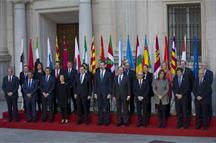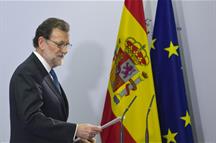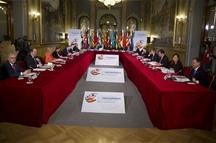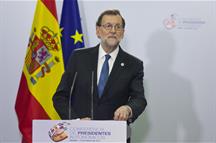Mariano Rajoy advocates financing agreement with regional governments to improve Welfare State
President's News - 2017.1.17
1. Images of the 6th Conference of Regional Presidents | Pool Moncloa/Marcos Martín - 2017.1.17
Upper House of Parliament, Madrid
During his press briefing and after he described the meeting as "highly constructive", the President of the Government explained that the first part of the conference focused on the current situation and future outlook for the Spanish economy, in which he stressed that some of the imbalances and competitiveness problems are being resolved.
Mariano Rajoy added that the revenue collected by all public authorities as a whole in 2016 was lower than the figure posted in 2007 but that the heading for pensions has increased by 40 billion euros.
The President of the Government reiterated that the priority for the coming years is to generate economic and employment growth because that will increase revenue in order to enable public services to be maintained and improved and public needs to be met.
In his opinion, achieving that objective will require ongoing fiscal consolidation and the policy of reforms implemented in recent years to be maintained. "This year, we need to go from 4.6% to 3.2%. Things will start to improve as from a deficit of 3%. We will have more room to manoeuvre and we will be able to implement more and better policies in the best interests of the people", he said.
Welfare model and demographics
The President of the Government said that the welfare model enjoyed in Spain is closely linked to regional government financing.
He said that Spain has a welfare model, a pension system, a healthcare system, an education system and public social services "like few other countries in the world". In this regard, he recalled that over 70% of public revenue is spent on social services and that over 14 million Spaniards receive benefits every month.
Mariano Rajoy reiterated that having a welfare model requires resources and, for those resources to exist, there must be an economic policy that creates employment. "From that point on, the regional governments hold most of the responsibility to maintain, sustain and improve the welfare model. They manage healthcare, education and social services. I have asked - and am convinced that everyone is with me on this - for us to make the greatest possible effort to reach an understanding on regional government financing".
 Pool Moncloa/Diego CrespoThe President of the Government added that there is no room for imposition or majorities holding sway over others on this topic. "We need an agreement with the regional governments on this issue, as well as an important agreement in Parliament, with particular emphasis on two areas moving forward: pensions and healthcare", he said.
Pool Moncloa/Diego CrespoThe President of the Government added that there is no room for imposition or majorities holding sway over others on this topic. "We need an agreement with the regional governments on this issue, as well as an important agreement in Parliament, with particular emphasis on two areas moving forward: pensions and healthcare", he said.
Furthermore, the President of the Government announced that the 6th Conference of Regional Presidents agreed to set up a working committee in the Upper House of Parliament on the issue of population loss affecting many parts of Spain. "This is affecting public services as a whole, pensions, healthcare, our education model and, therefore, should also be one of the main objectives for the future", he said.
Future of Europe
Mariano Rajoy also brought up the situation of a post-Brexit Europe at the Conference of Regional Presidents. "Our position is clear. We will start to negotiate when the British formally notify their intention to leave the EU. The four fundamental freedoms cannot be separated: people, goods, capital and services; and you cannot enjoy one of these freedoms without the others", he said. "It is the intention of both Spain and of the majority of countries in the European Union to maintain the closest possible relationship with the United Kingdom after it leaves the EU", he added.
Furthermore, he said that other priorities for the European Union include immigration on economic grounds, internal security, external security and defence, as well as growth, employment and, above all, dealing with the youth employment issue.
The President of the Government stressed that the third main issue, which is an issue for the future and requires not only significant parliamentary support but also an agreement between the regional governments, relates to the future of Europe. "After what has happened with Brexit, after embarking on an expansion of the economic and monetary union with the banking union, the time has now come to think about what we are going to do in terms of fiscal policy, what we are going to do with the European Budget, whether there will be a European fiscal authority or not and, above all, whether we are going to continue forward with political union or not", he said.
Specific agreements
 Pool Moncloa/Diego CrespoAn agreement was reached at the conference for a committee of experts including a representative from each region and the autonomous cities to begin work on a new regional financing model within the next month. That system will be based on the principles of solidarity, sufficiency, equality, transparency and fiscal co-responsibility. At the same time, the mechanisms in place to finance care for people in a situation of dependency and the evolution of spending on healthcare will be analysed.
Pool Moncloa/Diego CrespoAn agreement was reached at the conference for a committee of experts including a representative from each region and the autonomous cities to begin work on a new regional financing model within the next month. That system will be based on the principles of solidarity, sufficiency, equality, transparency and fiscal co-responsibility. At the same time, the mechanisms in place to finance care for people in a situation of dependency and the evolution of spending on healthcare will be analysed.
As regards the demographic challenge, an agreement was reached to draw up a National Strategy to tackle what Mariano Rajoy described as an "essential issue, perhaps the most important issue we are facing in Spain in the medium and long term". Furthermore, the President of the Government committed to bringing this debate to the heart of the European institutions.
Also regarding EU policy, the Spanish Conference for European Union Affairs has been announced for the first quarter of the year. "There are many issues that require building the greatest possible majority support in national terms and cooperation from the regional governments", argued Mariano Rajoy.
Employment and education
A similar agreement was reached on employment policies. Efforts will continue to modernise the Public Employment Services and improve the Vocational Training System - especially in terms of Dual Training - and special attention will be paid to the employability of young people and vulnerable groups.
The President of the Government explained that an agreement on gender-based violence was added at the last minute. This topic will be discussed during a specific debate in the Upper House of Parliament. The conclusions reached will be passed to the committee set up in the Lower House of Parliament to "firmly and effectively combat this serious problem", he stressed.
In terms of education, the General Committee of the Regional Governments in the Upper House of Parliament will be called to hold another specific debate, the conclusions of which will be added to the work carried out by the Lower House of Parliament sub-committee that is seeking a Government Pact on Education.
Social benefits
 Pool Moncloa/Diego CrespoAs regards more social issues, a working group will be set up within the next three months to design a "social card". This instrument will enable the social benefits provided to citizens by the various authorities to be continually updated.
Pool Moncloa/Diego CrespoAs regards more social issues, a working group will be set up within the next three months to design a "social card". This instrument will enable the social benefits provided to citizens by the various authorities to be continually updated.
Furthermore, it was agreed that the regional governments will participate in the regulatory development of the Decree on Protection for Vulnerable Electricity Consumers.
Setting up the National Civil Protection Council within the next three months was another of the agreements reached. The President of the Government explained that its main objective is to pool all the resources available to the regional governments and the Government of Spain in order to respond to this type of emergency more quickly and effectively.
The other agreements relate to a coordinated plan of emergency assistance for refugees, market unity, public employment and e-Government. Furthermore, the Regulations governing the Conference of Regional Presidents were amended to strengthen its institutional nature.
Current affairs
In response to a question on whether a regional financing model can be designed without the participation of the Regional Government of Catalonia, the President of the Government maintained the "open and permanent" invitation to take part in this debate for those who did not attend the Conference of Regional Presidents on Tuesday. In his opinion, it is "good for them to express their opinion and state their criteria" on a debate of such "enormous importance".
Mariano Rajoy expressed his willingness to speak with the President of the Regional Government of Catalonia but explained that "it is one thing for us to speak and another for there to be certain decisions for some and totally different decisions for others" because the regional financing model "will need to be agreed by us all".
 Pool Moncloa/Diego CrespoAs regards the statements by the President-Elect of the United States, Donald Trump, in which he criticised NATO and the EU, the President of the Government stated that NATO is a good example of trans-Atlantic collaboration and "works very well".
Pool Moncloa/Diego CrespoAs regards the statements by the President-Elect of the United States, Donald Trump, in which he criticised NATO and the EU, the President of the Government stated that NATO is a good example of trans-Atlantic collaboration and "works very well".
He went on to add that the people of Europe and Spain want to maintain the best possible relations with the people of America and their president, whom "we will only be able to judge" when he takes on the responsibilities of his position.
As regards the request for an apology made by the victims of the Yak-42 accident, Mariano Rajoy stressed that he agrees with "each and every one of the statements made yesterday by the Minister for Defence" and said that "we will always stand by our Spanish servicemen and the families of the victims of the accident in order to provide them with everything they need".





